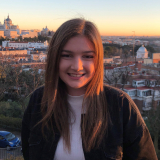TGF beta signaling as a driver in group 3 medulloblastoma

Mentor: Dr. William Weiss
Medulloblastoma is the most common malignant brain tumor in children. While 75% of patients are cured, survivors have significant neurocognitive and neuroendocrine impairments. Medulloblastoma is comprised of 4 distinct subgroups (WNT, SHH, Group 3 and 4). MYC amplified group 3 medulloblastoma is among the the most lethal. Amplification of a group of genes called TGF beta family genes occurs commonly in group 3 medulloblastoma, often in conjunction with amplification of the MYC oncogene, however functional roles have not been demonstrated. I will work with postdoc Zulekha Qadeer, focusing on roles for TGF beta family genes as drivers in medulloblastoma. Zulekha and I are starting with our unpublished observations, that TGF beta can drive medulloblastoma in a new human-in-mouse in-vivo model for this disease. In this model, we differentiated normal human induced pluripotent stem cells into hindbrain neuroepithelial stem cells (putative cells of origin for medulloblastoma), transduced these cells either with MYC, TFG beta pathway genes or both, and then injected the resulting cells orthotopically into the hindbrains of immunocompromised mice. In this system, MYC drove tumors, and the TGF beta genes ACVR2A, TGFB1, TGFBR1, accelerated MYC-driven tumors; with TGFβR1 and ACVR2A also driving tumors in the absence of MYC. Whether and how TGFβ signaling contributes to therapy resistance, and the identification of therapeutic vulnerabilities in medulloblastoma tumors driven by TGFβ represents the primary focus of my project. We have already derived cell lines from our TGFβ-driven group 3 medulloblastoma tumors. I will treat these with radiation, cis-platin to determine whether TGFβ signaling promotes therapy resistance (assaying cell growth by WST1, cell cycle by flow cytometry, apoptosis by PARP cleavage, and senescence acid beta galactosidase staining). I will also perform western analysis to look at TGFβ signaling, MYC levels, and other senescence and apoptotitic markers). I will also test these cells for sensitivity to targeted agents (clinical bromodomain inhibitors, CDK9 inhibitors, and clinical TGF beta inhibitors) to determine whether cells are sensitive to these agents). Promising results from cell culture will be validated using in-vivo models, and treating animals in-vivo.

